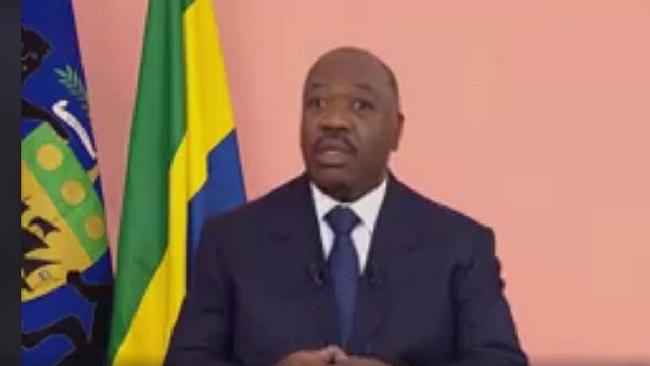Botched coup signals Bongo’s weakened grip on Gabon
While the rapid failure of Monday’s coup in Gabon highlighted the plotters’ lack of preparedness and support, analysts say the attempt alone signals mounting frustration with a government weakened by President Ali Bongo’s secretive medical leave.
Government spokesman Guy-Bertrand Mapangou announced the deaths and arrests after mutinous soldiers briefly seized the radio station in the capital, Libreville, and broadcast a message saying Bongo, who suffered a stroke in October, was no longer fit for office.
“The situation is under control,” Mapangou told FRANCE 24, describing the botched coup as a “flash in the pan” and its perpetrators – who referred to themselves as the Patriotic Youth Movement of the Gabonese Defence and Security Forces – as a “fictitious group” led by a “complete unknown”.
‘Political message’
Observers have stressed the amateurism of the plotters, whose swift demise suggests they enjoyed little support within the military hierarchy.
“A coup is not something you can carry out with five people; it requires financial and logistical means, backed by a military strategy,” said researcher Amadou Ba, a member of the Africa Group at the Institute for European Prospective and Security (IPSE) in Paris.
“But for all its lack of preparedness, the attempted takeover carried a political message, one that highlights the deep distress of the people of Gabon,” Ba told FRANCE 24. “All of this was predictable,” he added, pointing to the “political, economic and social crisis” the West African country is mired in.
Gabon’s economy has long been driven by oil revenues, much of which went to a moneyed elite while most of the two-million population live in deep poverty. But a sharp drop in oil output and prices in recent years has squeezed revenues, raising debt and stoking discontent. Oil workers’ strikes have become more common. Economic growth was 2 percent last year, down from over 7 percent in 2011.
In a report published after Monday’s dramatic events, Exx Africa Business Risk Intelligence said the attempted coup indicates “broad socio-economic and political frustration with Gabon’s leadership, which has been weakened by the suspected incapacitation of its strongman president”.
An ailing ruler
The 59-year-old Bongo, who succeeded his father in 2009, is currently recovering from a stroke in Morocco. He has not been back to Gabon since he was hospitalised in Saudi Arabia on October 24. In his absence, the Constitutional Court transferred part of his powers to the prime minister and the vice president, but analysts say Bongo’s lengthy absence and the lack of information about his health have added to the sense of a “power vacuum” at the top.
On New Year’s Eve, Bongo addressed the country for the first time since falling ill, saying in a recorded speech from Morocco that he had “been through a difficult period”. His critics, however, seized on signs of apparent ill-health, noting that the address was unusually short, his speech was slurred and his right hand seemed stiff and immobile.
The speech was “shameful”, the coup’s apparent leader said in the message broadcast at 4:30am on state radio, describing Gabon as a “country [that] has lost its dignity”. Lieutenant Kelly Ondo Obiang said the address “reinforced doubts about the president’s ability to continue to carry out of the responsibilities of his office”.
Ghosts of 2016
Among the grievances voiced by the mutinous soldiers featured Bongo’s highly disputed re-election in 2016, which was followed by deadly clashes between protesters and police. Referring to the violence, Ondo Obiang railed against “those who, in a cowardly way, assassinated our young compatriots on the night of August 31, 2016”.
The European Union said it found anomalies during the election in Bongo’s stronghold province of Haut-Ogooue, where he won 95 percent of the vote on a 99.9 percent turnout. Overall, the incumbent president won the poll by fewer than 6,000 votes, a result his challenger Jean Ping has refused to accept.
Monday’s failed putsch “is a reflection of the long-running frustrations triggered by Bongo’s highly contested re-election”, said Paul Melly, an associate fellow of the Africa Programme at London’s Chatham House, noting that the dispute had dented the president’s credibility.
“It’s clear that quite a few Gabonese feel somewhat frustrated with the loss of impetus in the early reform message of President Bongo’s rule,” Melly told FRANCE 24. “When he first came [to power] in 2009, [Bongo] was very much presenting himself, although the son of his father, as a face of reform and modernisation, but after the 2016 election controversy that rather faded.”
More than a ‘token coup’
Melly cautioned against reading Monday’s events as a direct consequence of the popular discontent.
“We have to distinguish very sharply between the general frustration with the way things have been going over the past couple of years and the actual putsch attempt itself, which seems to have been the work of a tiny group of people,” he explained.
Analysts have noted that Bongo, who served as defence minister under his late father Omar, enjoys a close rapport with the Gabonese army’s top brass. Historic ties with former colonial power France, which has a permanent military presence in the West African country and has firmly condemned Monday’s attempted coup, also act as a stabilising factor.
However, journalist Louis Magloire Keumayou, who heads the Paris-based African Information Club, warned that the failed putsch was only the latest indicator of mounting defiance against Bongo and his ruling Gabonese Democratic Party (PDG), which suffered a string of high-profile defections in the wake of the 2016 election.
“This defiance is no longer limited to the public, but has also reached parts of the political establishment and the military,” Keumayou told FRANCE 24. “Even if this was merely a token coup […], opposition to the regime is spreading and has not died down after the elections.”

(With REUTERS)





